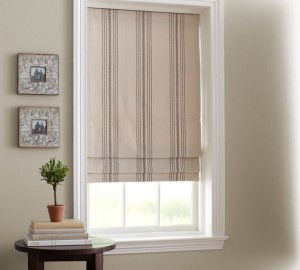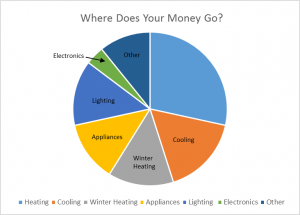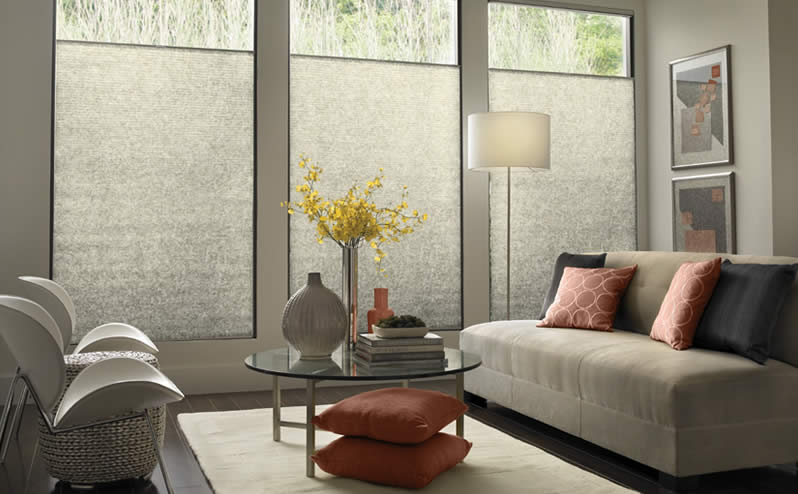Winter is coming and that means colder temperatures. Colder temperatures mean it is time to switch your thermostat over to heat. That switch can change your utility bill, which may have you trying to find ways to save dollars. As the graph at the end of the article shows, much of your utility dollars go toward heating and cooling your home. So what can you do to keep a little more money in your pocket? Have you considered your window treatments?
 According to the Hunter Douglas Company, as much as 50% of your home’s heating and cooling energy can be lost through your windows. Indoor heating moves toward and escapes through your windows, so window treatments can be an excellent way to add beauty to your home, as well as energy efficiency. Window treatments add insulation, which results in lower energy consumption and increased savings for your pocketbook (see Image 1). There are many types of window treatment choices available when looking to gain energy efficiency.
According to the Hunter Douglas Company, as much as 50% of your home’s heating and cooling energy can be lost through your windows. Indoor heating moves toward and escapes through your windows, so window treatments can be an excellent way to add beauty to your home, as well as energy efficiency. Window treatments add insulation, which results in lower energy consumption and increased savings for your pocketbook (see Image 1). There are many types of window treatment choices available when looking to gain energy efficiency.
One of the best choices is honeycomb, or cellular shades (see Images 2 and 3). Cell shades provide insulation and eliminate air flow through the shade. Additionally, they provide filtered light, which allows sunlight to aid in warming the room. Cellular shades can be used with other window treatments such as drapery panels or valances.
 Roman shades are another great choice (see Image 4). Roman shades can be raised and lowered throughout the day to provide added insulation to the window, protection for your floors and furnishings, and privacy. Roman shades are layered – topped with a fabric and then lined. Linings can range from regular to blackout, depending on your needs.
Roman shades are another great choice (see Image 4). Roman shades can be raised and lowered throughout the day to provide added insulation to the window, protection for your floors and furnishings, and privacy. Roman shades are layered – topped with a fabric and then lined. Linings can range from regular to blackout, depending on your needs.
Blinds have been used for years and are an economical choice. The biggest advantage of blinds is the slats can be adjusted to control light and ventilation. The disadvantage is that it is difficult to control heat loss during winter months because of the openings between slats, even when closed. On the flip side, blinds can reduce heat gain by around 45% when closed in summer months (See Image 5).
Need noise reduction in addition to added insulation? Blackout drapery panels are the answer (See image 6). Blackout drapery panels are panels that have a fabric on the front and a thick lining on the back. In addition to reducing noise and providing increased energy efficiency, blackout panels also block out any intrusive light, which can help out on those days when you would like to sleep in.
Image 7 shows a beautiful set of drapery sheers. Sheers have come a long way from what your Grandma may have had in her home years ago. There are many different patterns to choose from, as well as different levels of opaqueness. Some sheers are thinner, some are a little thicker. Sheers are often used with other treatments to add a layered look. Although sheers will not block out heat or provide insulation to keep heat in, they do provide protection for your floors and furnishings by filtering sunlight.
What if you have a view you do not want to lose by adding shades, blinds or draperies? Window tinting, or window film, may be your best option (See Image 7). Radiant energy is converted to heat as it strikes people or objects (Solar Gard, www.solorgard.com). Window film blocks this transfer of energy by reflecting the energy back, thus preventing the heat from striking objects. In normal people terms, this means that the heat is reflected away from the window, not into the room. Additionally, window films reduce glare into your space and also block 99% of UV radiation, which can contribute to skin cancer.
You have been armed with the information you need to make wise window treatment decisions. Need help in turning those decisions into reality? Give me a call… I can help!
In addition to her Interior Design work, Tammy Taylor
operates a retail location in Cramerton (open through October 31) and also
provides Interior Design Services through
Next Generation Interiors, also in Cramerton.
You can contact Tammy Taylor Interiors by calling
704.908.3740 or via email at [email protected]

